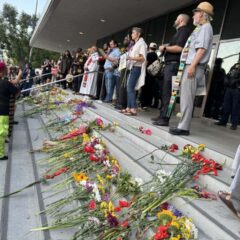This article was originally published on National Catholic Reporter, with the support of CRCC’s global project on engaged spirituality.
This year marks 30 years since violence exploded between Hutu and Tutsi ethnic groups in the sub-Saharan African nation of Burundi. A few months later, in neighboring Rwanda, genocidal violence between the two groups shocked the world. More than half a million people, most of them Tutsis, were killed in just 100 days.
The region has still not fully recovered, according to prominent Roman Catholic laywoman Marguerite (Maggy) Barankitse. Even people not yet born when the traumatic events occurred are affected, she said. “We must be able and have this audacity to teach our new generation how to forgive and turn the page,” Barankitse said. “Without forgiveness, there is no future.”
Barankitse is a Burundian who now lives in Rwanda. For more than 25 years, she has led Maison Shalom, or House of Peace, the holistic humanitarian organization she established to generate hope in the Great Lakes region of Africa.
Barankitse has witnessed horrific acts of genocide, political violence and social injustice, yet she is unwavering in her belief that good ultimately will prevail over evil. A recipient of the prestigious $1 million Aurora Prize for Awakening Humanity, she has garnered international praise for her work.
Despite ongoing challenges, Barankitse said people of faith must continue to work for lasting reconciliation. She believes forgiveness and education are the keys to moving forward. “With that, we will change our countries,” she says. “We will change the world and make a better world, where we can live with dignity, with tolerance.”
Click here to read the article on National Catholic Reporter
Kim Lawton is a journalist fellow with the Spiritual Exemplars Project.




